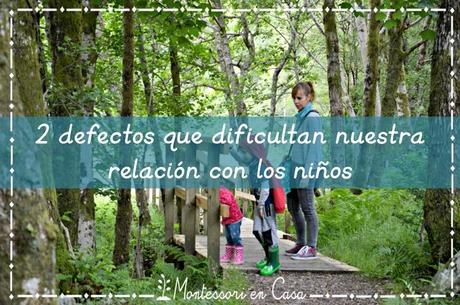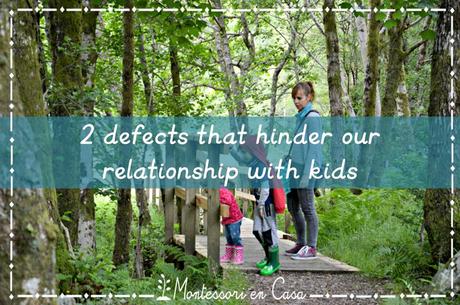

(scroll down for English)
Al leer el título puede que hayas pensado "¿Cómo? ¿Sólo dos?", y tienes razón, probablemente tenemos muchos más defectos que obstaculizan una relación de respeto hacia los niños, pero en este post voy a centrarme en los principales 2 defectos que dificultan nuestra relación con los niños.
¿Adivinas cuales son?
Uno de ellos es la ira, que a veces es nuestra reacción cuando el comportamiento del niño no cumple nuestras expectativas (conscientes o inconscientes), o cuando sentimos que las necesidades del niño entran en conflicto con las nuestras.
El otro es el orgullo, que nos hace pensar que por ser el adulto estamos en un lugar superior al niño.
Pero este post no es para que empieces a juzgarte y sentirte mal por tener esos defectos (todos los tenemos en mayor o menor medida). Este post es para darte una buena noticia: estos defectos tienen solución, y es tan simple (y a la vez tan difícil de lograr) como cambiarlos por sus opuestos:
Cambiar la IRA por PACIENCIA Cambiar el ORGULLO por HUMILDADPaciencia vs Ira
Un ejemplo:
Cuando somos pacientes, somos capaces de tolerar que un niño tarde 15 minutos en atarse los cordones, y somos capaces de apreciar su satisfacción aunque veamos que la lazada le ha quedado floja y se va a desatar en cuanto dé unos pasos.
Si en vez de afrontar esta misma situación con paciencia nos dejamos llevar por la ira, el hecho de tener que esperar esos interminables 15 minutos nos va a resultar exasperante (si es que somos capaces de esperar a que termine y no hacerlo nosotros), y el hecho de ver que después de esos 15 minutos de espera los cordones no están bien atados va a suponernos una frustración que no nos va a permitir disfrutar del logro que nuestro hijo acaba de conseguir.
Una objeción habitual:
Ahora me dirás "Vale, pero ¿quién tiene 15 minutos de sobra para poder afrontar esa situación con paciencia?". Es posible que no siempre tengas el tiempo que te gustaría para poder ir al ritmo de los niños, es una pena que en la sociedad en la que vivimos reine la prisa y no nos quede tiempo para detenernos en las cosas realmente importantes (porque para un niño es más importante el trabajo que hace aprendiendo a atarse los cordones que cumplir a rajatabla una apretada agenda de actividades). Pero te animo a que intentes buscar esos minutos extra, tal vez poniendo el despertador un poco antes (sé que es duro, pero merece la pena), o tal vez eliminando de la agenda diaria alguna cosa que no sea tan tan importante...
Humildad vs Orgullo
El orgullo nos hace creer que como somos adultos sabemos lo que le conviene al niño mejor que él mismo. Y esto no siempre es así. De hecho diría que la mayoría de las veces no lo es.
Un ejemplo:
Imagina un niño de 2 años que insistentemente intenta coger el salero durante la comida familiar. Desde el orgullo tal vez nuestra reacción sería decirle que deje de jugar con el salero, que en la mesa no se juega, o simplemente quitar el salero de su alcance sin más explicación. Nuestro orgullo nos hace pensar que lo que el niño está haciendo con el salero no es importante y más aún, que es molesto. En cambio, desde la humildad, tal vez nos paremos a pensar que si el niño tiene tanto interés por coger el salero debe ser por algún motivo, una necesidad de aprender que viene dictada desde su maestro interior, tal vez seamos capaces de ver que la manera de satisfacer esa necesidad es simplemente dejar que coja el salero y lo examine.
Cuando un niño escucha a su maestro interior decir "toca ese salero para aprender" y al mismo tiempo escucha a un adulto decir "no toques el salero" se encuentra entre la espada y la pared... Si hacemos un ejercicio de humildad y valoramos su necesidad de aprender dejaremos de ser un obstáculo para su desarrollo.
Una objeción habitual:
Es posible que estés pensando "¡Pero tampoco podemos dejar que los niños hagan lo que les dé la gana!". Totalmente de acuerdo, los niños necesitan saber que hay unos límites que todos debemos respetar, una cosa es seguir al niño y respetar su necesidad de aprender, y otra muy distinta es dejar que haga lo que quiera sin establecer ningún límite. Si te interesa saber más sobre este tema te recomiendo leer el post que escribí sobre libertad y límites.
¿Qué opinas sobre esto? ¿Crees que cambiar la ira por paciencia y el orgullo por humildad te ayudaría en tu relación con tus hijos y con los niños en general? ¡Cuéntamelo en los comentarios!
¿Te ha gustado este post? ¡Compartelo!


Reading the title you may have thought "How? Only two?" And you're right, we, as adults, probably have many more defects that hinder our relationship of respect towards children, but in this post I will focus on the main two defects that hinder our relationship with children.
Guess what they are?
One of them is anger, which sometimes is our reaction when the child's behavior does not meet our expectations (conscious or unconscious), or when we feel that the child's needs conflict with ours.
The other is pride, which makes us think that because we are adults we are superior than the child.
But this post is not for you to start judging yourself and feel bad about having these defects (we all have them in a greater or lesser extent). This post is to give you good news: these defects have a solution, and it's as simple (and as difficult to achieve) as changing them for their opposites:
From ANGER to PATIENCE From PRIDE to HUMILITYPatience vs Anger
An example:
When we are patient, we are able to tolerate that it takes 15 minutes for a child to tie his shoe, and we are able to appreciate their satisfaction although we see that the loop is loose and will unleash after a few steps.
If instead of facing the same situation with patience we get carried away by anger, the fact of having to wait those endless 15 minutes we will be exasperating (if we are able to wait until the end), and the fact that the cords are not well tied after those 15 minutes of waiting will bring upon us a frustration that will not let us enjoy the achievement our kid just got.
A common objection:
Now you might say "Okay, but who has 15 spare minutes to meet this situation with patience?". You may not always have the time you would like to be able to keep up with children, it is a pity that in the society in which we live reigns hurry and we don't have time to dwell on the really important things (because for a child it is more important the work that he makes learning to tie his shoelaces than following a busy schedule of activities). But I encourage you to try to find those extra minutes, maybe setting the alarm a little earlier (I know it's hard, but worth it), or perhaps eliminating from the daily schedule something that is not so important...
Humility vs Pride
Pride makes us believe that as adults we know what suits the child better than himself. And this is not always the case. I would say most times it is not.
An example:
Imagine a 2 year old insistently trying to catch the salt shaker during the family meal. From pride perhaps our reaction would be telling her to stop playing with the salt shaker, or simply remove the salt shaker from her reach without further explanation. Our pride makes us think that what the child is doing with the salt shaker is not important and even more, is annoying.
Instead, from humility, perhaps we will stop to think that if the child is so interested in taking the salt shaker it must be for some reason, a need to learn that is dictated from their inner teacher, maybe we will be able to see that the way to meet that need is to simply let her take the salt shaker and explore it.
When a child hears his inner teacher say "touch that salt shaker to learn" while listening to an adult say "do not touch the salt shaker" she is between a rock and wall... If we do an exercise in humility and value their need to learn we will stop being an obstacle to their development.
A common objection:
You may be thinking "But we can not let the kids do whatever they want!". I totally agree, children need to know that there are limits that we must all respect, one thing is to follow the child and respect their need to learn, and quite another to let them do whatever they want without setting any limit. If you are interested to know more about this topic I recommend reading the post I wrote about freedom and limits.
What do you think about this? Do you think changing from anger to patience and from pride to humility would help you in your relationship with your children and with children in general? Tell me about it in the comments!
Did you like this post? Share it!
(Visited 1.009 times, 1 visits today)

